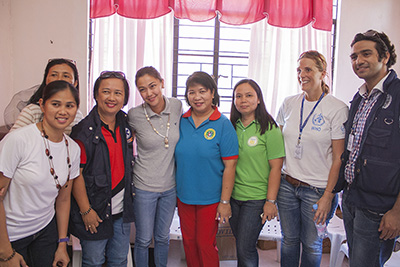
My name is Ina Bluemel, I am an emergency health expert from Germany who joined the WHO team in the Philippines on the 16th of November 2013 just 8 days after Typhoon Yolanda made landfall. My role was to assist with the assessment of health needs and coordination of health partners in Eastern Samar and I have been working in the Province since.
The first days and weeks after an emergency of the scale of this typhoon are always very intense. There is an immediate focus on saving lives and establishing basic services to ensure health care can be provided. As health cluster coordinator for WHO my role was to ensure that the many foreign medical teams and national health workers that came to provide health care were reaching out to as many people as possible and provide the most urgently needed services immediately. At the same time assessments have to happen to understand the scope of destruction, be able to direct partners towards priority needs and identify where there may be gaps in services or overlapping work by multiple partners in the near future. It is vital for my role to have to have good information on where the greatest needs are so that we can make sure the different medical teams in the area reach as many people as possible with all emergency services required.
One of the most urgent needs that transpired in the initial phase of the response was mental health and psychosocial support to help people cope with the horrific experience made during and after the typhoon. Many had lost family and friends, have seen their homes destroyed, and were suddenly facing a dependency on hand outs when their livelihoods were destroyed.
A number of mental health assessments were done by partners such as MSF Belgium. The observations made showed that while – like anywhere in the world – Eastern Samar has community members with chronic mental health illnesses, there were very limited professional services to manage their conditions.
With support from MSF and WHO the Provincial Health Office seized the “Yolanda window of opportunity” to build up the capacity of its teams to provide better mental health facilities. Together we have trained medical doctors and nurses on the diagnosis of mental health conditions and the prescription of quality drugs. Where there was only one doctor in November there are now 28 staff with the most up to date knowledge of managing mental illnesses. A further 35 will be trained later in May. Drug supplies are being secured to ensure the chronically ill have permanent access to so called psychotropic drugs – free of charge! One of the district hospitals in the province now has 3 beds reserved and equipped for the management of acute mental health crisis and further “beds” will follow. The Provincial Health Officer has pushed us and all other partners into providing the support she required to make such huge progress in the short time since Yolanda struck. The DOH counterpart in the province has been supportive all along and is behind the planning – and funding - of the next mental health training. It has been a real team effort between us at WHO, the other NGOs and agencies in the area and the health authorities in the province.
My contribution to all this has been quite small: I needed to help ensure the formation of the Mental Health and Psychosocial Support (MHPSS) working group that brings together all partners from health, education and protection. The group’s role is to ensure that the community receives the best service possible, whether it is psychosocial support required to deal with the emotional shock that Yolanda caused to so many – or quality treatment for chronic mental health conditions that for so long have been neglected in the province. We meet regularly to discuss how we can achieve a coherent approach to MHPSS across the different sectors and with the many stakeholders involved. There is still a long way ahead of us and there are lots more activities planned, but observing the incredible commitment of everyone involved I am very excited to see where it leads us – and very fond of having been a part of the journey to better access to mental health and psychosocial support in Eastern Samar.
